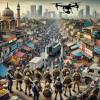"Punjab Government Financing Front Group for Lashkar-e-Taiba Terrorists"
With the change in the political guard in Pakistan following the May 11 general election, apprehensions have grown in India regarding the strategy of the newly-crowned government of Prime Minister Nawaz Sharif to fight Kashmir-centric militant groups, especially the Lashkar-e-Taiba (LeT) and its various incarnations.


